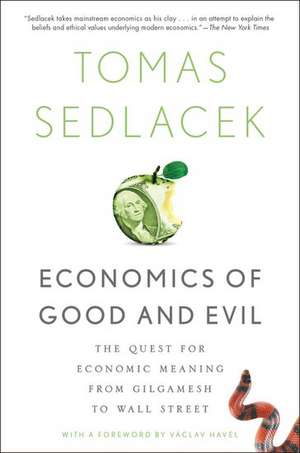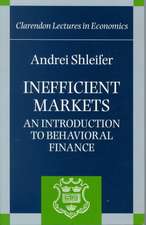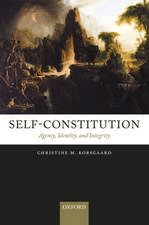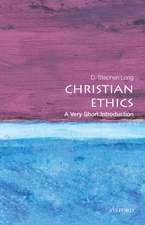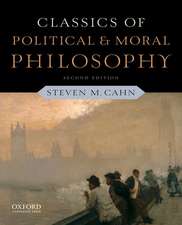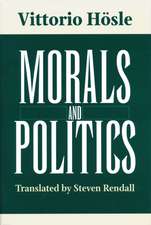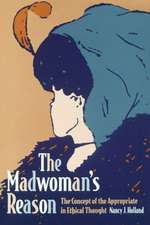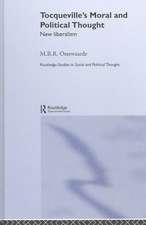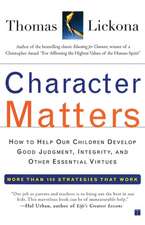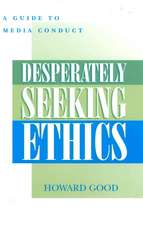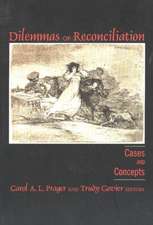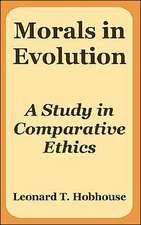Economics of Good and Evil: The Quest for Economic Meaning from Gilgamesh to Wall Street
Autor Tomas Sedlaceken Limba Engleză Paperback – 28 noi 2013
In The Economics of Good and Evil, Sedlacek radically rethinks his field, challenging our assumptions about the world. Economics is touted as a science, a value-free mathematical inquiry, he writes, but it's actually a cultural phenomenon, a product of our civilization. It began within philosophy--Adam Smith himself not only wrote The Wealth of Nations, but also The Theory of Moral Sentiments--and economics, as Sedlacek shows, is woven out of history, myth, religion, and ethics. "Even the most sophisticated mathematical model," Sedlacek writes, "is, de facto, a story, a parable, our effort to (rationally) grasp the world around us." Economics not only describes the world, but establishes normative standards, identifying ideal conditions. Science, he claims, is a system of beliefs to which we are committed. To grasp the beliefs underlying economics, he breaks out of the field's confines with a tour de force exploration of economic thinking, broadly defined, over the millennia. He ranges from the epic of Gilgamesh and the Old Testament to the emergence of Christianity, from Descartes and Adam Smith to the consumerism in Fight Club. Throughout, he asks searching meta-economic questions: What is the meaning and the point of economics? Can we do ethically all that we can do technically? Does it pay to be good?
Placing the wisdom of philosophers and poets over strict mathematical models of human behavior, Sedlacek's groundbreaking work promises to change the way we calculate economic value.
| Toate formatele și edițiile | Preț | Express |
|---|---|---|
| Paperback (1) | 88.87 lei 11-16 zile | +36.87 lei 6-12 zile |
| Oxford University Press – 28 noi 2013 | 88.87 lei 11-16 zile | +36.87 lei 6-12 zile |
| Hardback (1) | 127.94 lei 32-37 zile | |
| Oxford University Press – 16 iun 2011 | 127.94 lei 32-37 zile |
Preț: 88.87 lei
Preț vechi: 103.70 lei
-14% Nou
17.01€ • 17.54$ • 14.19£
Carte disponibilă
Livrare economică 24 februarie-01 martie
Livrare express 19-25 februarie pentru 46.86 lei
Specificații
ISBN-10: 019932218X
Pagini: 384
Dimensiuni: 235 x 156 x 17 mm
Greutate: 0.54 kg
Editura: Oxford University Press
Colecția OUP USA
Locul publicării:New York, United States
Descriere
Tomas Sedlacek has shaken the study of economics as few ever have. Named one of the "Young Guns" and one of the "five hot minds in economics" by the Yale Economic Review, he serves on the National Economic Council in Prague, where his provocative writing has achieved bestseller status. How has he done it? By arguing a simple, almost heretical proposition: economics is ultimately about good and evil.
In The Economics of Good and Evil, Sedlacek radically rethinks his field, challenging our assumptions about the world. Economics is touted as a science, a value-free mathematical inquiry, he writes, but it's actually a cultural phenomenon, a product of our civilization. It began within philosophy--Adam Smith himself not only wrote The Wealth of Nations, but also The Theory of Moral Sentiments--and economics, as Sedlacek shows, is woven out of history, myth, religion, and ethics. "Even the most sophisticated mathematical model," Sedlacek writes, "is, de facto, a story, a parable, our effort to (rationally) grasp the world around us." Economics not only describes the world, but establishes normative standards, identifying ideal conditions. Science, he claims, is a system of beliefs to which we are committed. To grasp the beliefs underlying economics, he breaks out of the field's confines with a tour de force exploration of economic thinking, broadly defined, over the millennia. He ranges from the epic of Gilgamesh and the Old Testament to the emergence of Christianity, from Descartes and Adam Smith to the consumerism in Fight Club. Throughout, he asks searching meta-economic questions: What is the meaning and the point of economics? Can we do ethically all that we can do technically? Does it pay to be good?
Placing the wisdom of philosophers and poets over strict mathematical models of human behavior, Sedlacek's groundbreaking work promises to change the way we calculate economic value.
Notă biografică
Tomas Sedlacek lectures at Charles University and is a member of the National Economic Council in Prague, where the original version of this book was a national bestseller and was also adapted as a popular theater-piece. He worked as an advisor of Vaclav Havel, the first Czech president after the fall of communism, and is a regular columnist and popular radio and TV commentator.
Recenzii
A Washington Post Politics 'Must Read'
